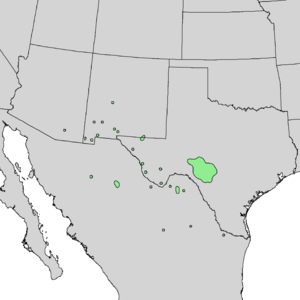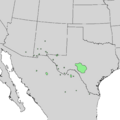Sandpaper oak facts for kids
Quick facts for kids Sandpaper oak |
|
|---|---|
| Conservation status | |
| Scientific classification |
|
| Kingdom: | Plantae |
| Clade: | Tracheophytes |
| Clade: | Angiosperms |
| Clade: | Eudicots |
| Clade: | Rosids |
| Order: | Fagales |
| Family: | Fagaceae |
| Genus: | Quercus |
| Subgenus: | Quercus subg. Quercus |
| Section: | Quercus sect. Quercus |
| Species: |
Q. pungens
|
| Binomial name | |
| Quercus pungens Liebm.
|
|
 |
|
| Natural range | |
| Script error: The function "autoWithCaption" does not exist. | |
| Synonyms | |
|
|
Script error: No such module "Check for conflicting parameters".
The Quercus pungens, also known as the sandpaper oak or scrub oak, is a type of oak tree or large shrub found in North America. It belongs to the group of white oaks. This plant is either evergreen (meaning it keeps its leaves all year) or sub-evergreen (meaning it keeps most of its leaves through winter).
There is one special type of sandpaper oak called Quercus pungens var. vaseyana, which is known as the Vasey shin oak. Sometimes, the sandpaper oak can mix its genes with the gray oak (Quercus grisea). This mixing, called hybridizing, happens in places like the Guadalupe Mountains in New Mexico and Texas.
Contents
Where Sandpaper Oaks Grow
Sandpaper oaks and Vasey shin oaks are very common in certain parts of Texas. You can find them a lot in the Edwards Plateau and the Trans-Pecos region. They also grow in the Guadalupe Mountains.
Going further west, they appear in the mountains of southeastern Arizona and southwestern New Mexico. You can also find them in northern and eastern Mexico. This includes areas like Chihuahua, Coahuila, Durango, Nuevo León, and Veracruz.
What Sandpaper Oaks Look Like
The sandpaper oak can grow as a small tree, reaching up to 12 meters (40 feet) tall. It can also be a large shrub that grows in thick groups called thickets. Its bark is light brown and feels like paper.
The small branches, called twigs, are gray. When they are young, they have short, soft hairs. As they get older, these twigs become smooth. The buds are dark reddish-brown and have a few hairs on them.
Leaves and Texture
The leaves of the sandpaper oak are tough and leathery. They are semi-evergreen, meaning they stay green for most of the year. When they first appear, they are bright and shiny green. Later, they turn a darker green.
The tree gets its name "sandpaper oak" because of its rough leaves. This rough feeling comes from tiny, strong hair bases on the leaf surface.
Flowers and Acorns
In the spring, the sandpaper oak grows reddish flowers. The female flowers usually appear in groups of one to three. The male flowers grow in larger groups.
The acorns of this oak tree are light brown. They are shaped like a wide oval with a rounded top. Their cups are not very deep and are covered with thick gray hairs. You can find these acorns growing alone or in pairs.
Where Sandpaper Oaks Live
These oaks prefer to live on dry, rocky slopes. These slopes can be made of limestone or igneous rock. They usually grow at heights between 800 and 2000 meters (2660 to 6670 feet) above sea level.
You can often find them in chaparral areas, which are dry lands with many shrubs. They also grow in desert scrub savanna, which is like a grassland with scattered trees and shrubs. They often live with other oaks, junipers, and pinyon pines.
Plant Neighbors
In the chaparral areas of the Guadalupe Mountains, the sandpaper oak is one of the main plants. It grows next to other plants like true mountain-mahogany (Cercocarpus montanus) and desert ceanothus (Ceanothus greggii).
Other plants that often grow near the sandpaper oak include:
- Mohr shin oak (Quercus mohriana)
- Oneseed juniper (Juniperus monosperma)
- Cane cholla (Opuntia imbricata)
- Purplefruited pricklypear (Opuntia phaeacantha)
- Mexican buckeye (Ungnadia speciosa)
- Texas persimmon (Diospyros texana)
- Hairy tridens (Erioneuron pilosum)
- Plateau oak (Quercus fusiformis)
Images for kids
See also
 In Spanish: Quercus pungens para niños
In Spanish: Quercus pungens para niños
 | William Lucy |
 | Charles Hayes |
 | Cleveland Robinson |



